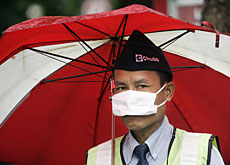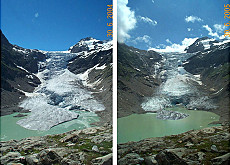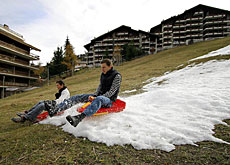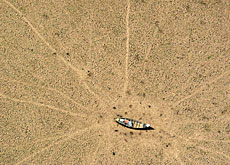Climate report urges sweeping CO2 cuts

The world needs to cut annual greenhouse gas emissions by up to 85 per cent over the next decades to keep global warming in check, a United Nations report says.
The Swiss government has already called for joint and swift action by the international community.
The Intergovernmental Panel on Climate Change (IPCC) report, approved in Bangkok on Friday, said keeping the rise in temperatures to within two degrees celsius would cost only 0.12 per cent of global Gross Domestic Product.
“It’s a low premium to pay to reduce the risk of major climate damage,” said Bill Hare, a Greenpeace adviser who co-authored the report.
“It shows that it’s economically and technically feasible to make deep emission reductions sufficient to limit warming. It shows that the costs of doing this are quite modest,” he added.
Emissions of carbon dioxide need to drop between 50 and 85 percent by 2050, in order to keep within the two degrees threshold which scientists say is needed to stave off disastrous changes to the world’s climate the report said.
However, technological advances – particularly in producing and using energy more efficiently – meant that such targets were within reach, experts said.
The report highlighted the use of nuclear, solar and wind power, more energy-efficient buildings and lighting, as well as capturing and storing carbon dioxide spewed from coal-fired power stations and oil and gas rigs.
Action
Agreed by scientists and officials from more than 100 countries after marathon talks, the report does not set out policies. Instead it reviews the latest science on the costs as well as the means to curb emissions growth and is designed as a blueprint for governments.
Current policies were inadequate, and action was needed now, it said.
“The need for immediate short-term action in order to make any significant impact in the longer term has become apparent,” the report warned.
Delegates pointed out that the onus was now on governments to put the report into action.
The Swiss environment minister, Moritz Leuenberger, said the new report underlined the need for action and coordinated approach by all countries.
“The report encourages us to increase efforts in the fight against global warming. Thanks to the report we know the options as well as the costs of reducing emissions,” Leuenberger said in a statement.
Swiss responsibility
The Swiss branch of Greenpeace, added that Switzerland with its comparatively high amount of per capita emission had specific responsibility.
A statement said the authorities should ensure that greenhouse gas emissions are cut in line with a law approved by parliament earlier this year.
Alexander Hauri of Greenpeace also called for further 30 per cent reduction in carbon emissions between 2012 and 2020 and for Switzerland to offer its good services and expertise in international climate talks.
At the meeting in Bangkok this week, China and Europe sparred about the costs and levels of greenhouse gas emissions which ought to be allowed.
China, the world’s number two emitter of greenhouse gases after the United States, wanted the IPCC report to exclude language which would promote stabilising emissions near current levels in part because of the limited economic studies available.
swissinfo with agencies
The Intergovernmental Panel on Climate Change (IPCC) was established in 1988 by two UN organisations, the World Meteorological Organization (WMO) and the UN Environment Programme (Unep) to assess the “risk of human-induced climate change”.
The Panel is open to all members of the WMO and Unep.
IPCC reports are widely cited in almost any debate related to climate change.
National and international responses to climate change generally regard the UN climate panel as authoritative.
Mitigation of Climate Change is the title of the third and final climate change report by the IPCC to be published this year.
It focuses on recommendations for action and the financial costs of steps to keep global warming in check.
Two previous reports, published in February and April, centred on possible impacts and adaptation measures as well the physical science basis of global warming.
More than 2,500 scientific expert reviewers, 800 contributing authors and 450 lead authors from over 130 countries contributed to the reports.

In compliance with the JTI standards
More: SWI swissinfo.ch certified by the Journalism Trust Initiative



You can find an overview of ongoing debates with our journalists here. Please join us!
If you want to start a conversation about a topic raised in this article or want to report factual errors, email us at english@swissinfo.ch.